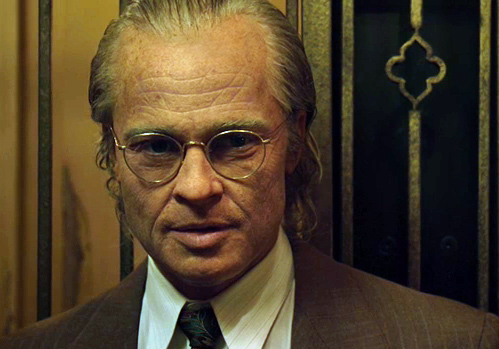|
"Curious Case of Benjamin Button" by F. Scott Fitzgerald

Permission is granted to reprint the following article as long
as no changes are made and the byline, copyright information,
and the resource box is included. Please let me know if you
use this article by sending an email to dje@newedisongazette.com.
"Curious Case of Benjamin Button" by F. Scott Fitzgerald
A short-story review Douglas W. Jerving
Copyright © 2008 Douglas W. Jerving.
All Rights Reserved.
Below is my review of the short story by F. Scott Fitzgerald "Curious Case of Benjamin Button",
upon which the 2008 motion picture is based.
The movie loosely follows the short story by F. Scott Fitzgerald, whose jazz era writings were
satirical critques of 1920s society. Below is a link to the story, obviously typed in without proper
editing but still without to many typos.
http://www.readbookonline.net/read/690/10628/
I am reading this story right now. I'm sure the movie is nowhere near as interesting as the prose is.
Here is a beautifully written line from part 5, paragraph 2:
A full moon drenched the road to the lustreless colour of platinum,
and late-blooming harvest flowers breathed into the motionless air
aromas that were like low, half-heard laughter. The open country,
carpeted for rods around with bright wheat, was translucent as in the day.
I love the poetic, internal-rhyming sound of "half-heard laughter" that Fitzgerald uses in the passage.
You will also notice the alliteration of "country, carpeted" and "rods around"; things that only poets
seem to pick out of great prose like this.
From part 8, paragraph 11 we read this
But just think how it would be if every one else looked at things
as you do--what would the world be like?"
which appears to me to be the theme of the story. The old addage that wisdom is wasted on youth
is appropriate.
It is perilous to read on and see how closely old age and youth are really the same event for the
human race (Part II). We descend back into childhood in a sense, known only true by those who
love us, even though they want us to remain the wise-olds they once remembered us to be.
(I cannot help but think of your Great-Grandma Libby, alhough the conclusions certainly don't have
to apply to her.)
all these had faded like unsubstantial dreams from his mind as though they had never been.
He did not remember.
This story portrays life as it really is for the majority of people who live on earth; a beautiful but bitter
moment in all of eternity for mankind, filled with angst, unfulfillment and ultimately eternal darkness
and forgottenness. Scott Fitzgerald portrays all mankind as a kind of existentialist smoke rising
upward, and then vanishing forever, hopelessly into the void of eternity. This is the only hope of all
mankind outside of Christ, Who makes life finally of value. This is the philosophy of the book of
Ecclesiastes, that man apart from God is hopeless, goal-less, and in the end lost. This is a bitter
and tragic tale of what man has to look forward to outside of the grace of God.
It is man without hope.
Thank God we have a hope of eternity that supercedes such tragedy as we look for that city
Who's builder and maker is God who will wipe every tear of this world from our eyes in eternity
and who instills this wonderful hope in us now even as we live this life of sorrows and joys.
------------------------
Doug Jerving is the publisher of the NewEdisonGazette.com. You may contact him at
dje@newedisongazette.com.
=================================

Return to The New Edison Gazette main site.
|
|